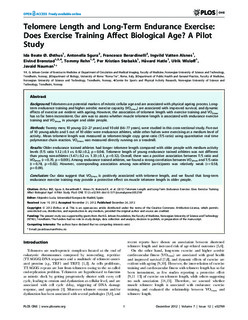Telomere Length and Long-Term Endurance Exercise: Does Exercise Training Affect Biological Age? A Pilot Study
Østhus, Ida Beate Øyen; Sgura, Antonella; Berardinelli, Francesco; Alsnes, Ingvild Vatten; Brønstad, Eivind; Rehn, Tommy Aune; Støbakk, Per Kristian; Hatle, Håvard; Wisløff, Ulrik; Nauman, Javaid
Journal article, Peer reviewed
Permanent lenke
http://hdl.handle.net/11250/2365726Utgivelsesdato
2012Metadata
Vis full innførselSamlinger
Sammendrag
Background:
Telomeres are potential markers of mitotic cellular age and are associated with physical ageing process. Long-term endurance training and higher aerobic exercise capacity (VO2max) are associated with improved survival, and dynamic effects of exercise are evident with ageing. However, the association of telomere length with exercise training and VO2max has so far been inconsistent. Our aim was to assess whether muscle telomere length is associated with endurance exercise training and VO2max in younger and older people.
Methods:
Twenty men; 10 young (22–27 years) and 10 old (66–77 years), were studied in this cross-sectional study. Five out of 10 young adults and 5 out of 10 older were endurance athletes, while other halves were exercising at a medium level of activity. Mean telomere length was measured as telomere/single copy gene-ratio (T/S-ratio) using quantitative real time polymerase chain reaction. VO2max was measured directly running on a treadmill.
Results:
Older endurance trained athletes had longer telomere length compared with older people with medium activity levels (T/S ratio 1.12±0.1 vs. 0.92±0.2, p = 0.04). Telomere length of young endurance trained athletes was not different than young non-athletes (1.47±0.2 vs. 1.33±0.1, p = 0.12). Overall, there was a positive association between T/S ratio and VO2max (r = 0.70, p = 0.001). Among endurance trained athletes, we found a strong correlation between VO2max and T/S ratio (r = 0.78, p = 0.02). However, corresponding association among non-athlete participants was relatively weak (r = 0.58, p = 0.09).
Conclusion:
Our data suggest that VO2max is positively associated with telomere length, and we found that long-term endurance exercise training may provide a protective effect on muscle telomere length in older people.
